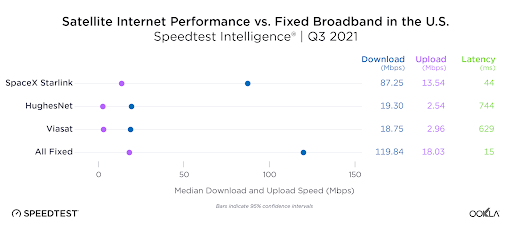Satellite internet gets another big boost, as Starlink continues to broaden its horizons and expand to other countries, and SpeedTest decided to conduct an efficiency study to notice any dips in quality.
SpeedTest conducted a study across 12 separate countries, measuring the impact of Starlink’s expansion by accounting for relevant metrics across Q3 2021. Download speed, upload speed, and latency were measured across the aforementioned countries (namely the USA, Australia, Belgium, Brazil, Canada, Chile, Colombia, France, Germany, Mexico, New Zealand, and the UK). Starlink wasn’t the only service to be measured, however, with SpeedTest adding the HughesNet and Viasat Satellites to the mix, and drawing a comparison with them against fixed broadband. With the metrics and parameters of the study established, let’s take a deep dive and note some prominent and relevant findings of SpeedTest’s endeavors.
Overall, in applicable regions, Starlink outperformed all competitors, even out-gunning fixed broadband services in the process. Brazil, Colombia, Mexico, and Chile are exemptions to this rule, owing to the fact that Starlink service isn’t widely available across these countries. Colombia and Chile largely relied on HughesNet, which was severely outdone by fixed broadband connections in these areas. Mexico and Brazil had Viasat as an option as opposed to HughesNet, but even that proved no match for the upload and download speeds reached by fixed broadband. However, other Western areas continued to enjoy decent internet connections all owing to Starlink performing rather well. Broadband connections did, however, give Starlink a run for its money in Canada and France. With the former, broadband inched the satellite competitor out in terms of both upload and download speeds, with differences of approximately 7 Mbps for the former and 6 for the latter. France had a more interesting scenario, with broadband having a superior upload speed by a large margin to Starlink, but then getting almost just as widely beaten in terms of download speed. Overall, a pretty mixed and average bag for these countries.
Overall, SpeedTest notes that there have been some definite dips in network speed for Starlink across Q2 to Q3. However, in terms of overall success, Starlink and broadband networks still remain the best sources of internet that users can rely on across the West, and broadband providers being the near-sole hope for netizens in Chile, Mexico, Colombia, and Brazil. Take a look at below charts for more insights:
Read next: Smart Homes and the Promise of Safety
SpeedTest conducted a study across 12 separate countries, measuring the impact of Starlink’s expansion by accounting for relevant metrics across Q3 2021. Download speed, upload speed, and latency were measured across the aforementioned countries (namely the USA, Australia, Belgium, Brazil, Canada, Chile, Colombia, France, Germany, Mexico, New Zealand, and the UK). Starlink wasn’t the only service to be measured, however, with SpeedTest adding the HughesNet and Viasat Satellites to the mix, and drawing a comparison with them against fixed broadband. With the metrics and parameters of the study established, let’s take a deep dive and note some prominent and relevant findings of SpeedTest’s endeavors.
Overall, in applicable regions, Starlink outperformed all competitors, even out-gunning fixed broadband services in the process. Brazil, Colombia, Mexico, and Chile are exemptions to this rule, owing to the fact that Starlink service isn’t widely available across these countries. Colombia and Chile largely relied on HughesNet, which was severely outdone by fixed broadband connections in these areas. Mexico and Brazil had Viasat as an option as opposed to HughesNet, but even that proved no match for the upload and download speeds reached by fixed broadband. However, other Western areas continued to enjoy decent internet connections all owing to Starlink performing rather well. Broadband connections did, however, give Starlink a run for its money in Canada and France. With the former, broadband inched the satellite competitor out in terms of both upload and download speeds, with differences of approximately 7 Mbps for the former and 6 for the latter. France had a more interesting scenario, with broadband having a superior upload speed by a large margin to Starlink, but then getting almost just as widely beaten in terms of download speed. Overall, a pretty mixed and average bag for these countries.
Overall, SpeedTest notes that there have been some definite dips in network speed for Starlink across Q2 to Q3. However, in terms of overall success, Starlink and broadband networks still remain the best sources of internet that users can rely on across the West, and broadband providers being the near-sole hope for netizens in Chile, Mexico, Colombia, and Brazil. Take a look at below charts for more insights:
Read next: Smart Homes and the Promise of Safety














